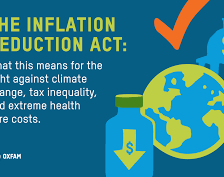The confirmation of the Congress of the Inflation Reduction Act of 2022 (IRA) has fuelled fears of a transatlantic trade war in the EU. The plan – a huge fiscal, climate and health package in place from 2023 – provides subsidies of more than $369 billion to companies in the renewable sector. The law offers tax incentives to those who choose to buy products made in the USA (eg electric cars). This dissuades Americans from turning to European producers, who would be forced to produce on US territory.
A trade war with Washington cannot be won by European countries. But the reactions of the Old Continental chancelleries reveal the determination to defend their interests, damaged not only by the anti-inflation law. In recent weeks, several European officials and representatives have not denied the impression that Washington is profiting from the war situation, especially through the sale of huge quantities of weapons and liquefied natural gas (LNG) to Europe at prices that are not exactly favorable. In contrast to the Old Continent, which seems to bear the most costly consequences (energy, industrial and economic) of the war in Ukraine. The frankly protectionist spirit of the IRA has taken the perception among Europeans that the "alliance" with the US is such only nominally ("Is Washington still our ally? ", summarizes a senior EU official).
France and Germany, on a collision course on almost every other important dossier, nevertheless reacted to the American provocation jointly and suddenly. President French Emmanuel Macron, on a state visit to Washington in recent days, has spoken out for continental frustration by calling the so-called anti-inflation law a "super aggressive" measure. Among the possible measures to combat the American measure, Macron has even launched the idea of a Buy European Act, an initiative that in the same spirit would be aimed at protecting the European market from American and Chinese competition. Germany, equally determined but initially more cautious, now seems to align itself with the positions of Paris: for German Economy Minister Robert Habeck, the EU should oppose a "strong response" to US law, opening up the possibility of establishing state incentives for the purchase of goods produced on European soil.
Realistically, however, the room for manoeuvre is very small. Europeans can at most hope for some exemption or derogation in the application of the American regulation to their products, as already obtained by Mexico and Canada. But the law has been passed and is unlikely to undergo radical revisions. Above all because, although European countries are also paying the price, the operation is actually primarily aimed at reducing dependence on China, which together with a few other actors holds control of the supply chains of raw materials necessary for the energy transition. The IRA must therefore be read in the perspective of the greatest Sino-American confrontation, for Washington a priority over the well-being of the European market. Indeed, the United States would like the old continental governments to decide to treat Beijing as a systemic rival. However, as Charles Michel's trip today and the recent one of German Chancellor Olaf Scholz to China testify, it would be difficult in our latitudes to stop considering the People's Republic as a trading partner. Especially after the severing of energy ties with Russia. The only way for the Europeans is to remind Washington that, if it wants an EU strong enough to counterbalance Beijing and Moscow, it is in its interest not to weaken it too economically. And to signal that in the event of a trade war between Europe and the United States, China could be "the only winner", as Czech Jozef Síkela recently warned when chairing a meeting of European trade ministers.


